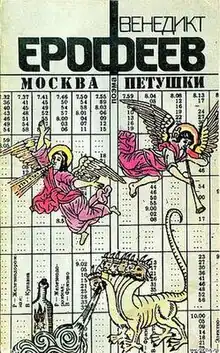Moscow-Petushki
Moscow-Petushki, also published as Moscow to the End of the Line, Moscow Stations, and Moscow Circles, is a pseudo-autobiographical postmodernist prose poem by Russian writer and satirist Venedikt Yerofeyev.
 | |
| Author | Venedict Yerofeyev |
|---|---|
| Original title | Москва - Петушки |
| Country | Soviet Union |
| Language | Russian |
| Genre | Pseudo-autobiographic novel |
| Publisher | Self-published (Samizdat) |
Publication date | 1970 (Samizdat) & 1973 (commercial release, in Israel) |
| OCLC | 6144525 |
Written between 1969 and 1970 and passed around in samizdat,[1] it was first published in 1973 in Israel[2] and later, in 1977, in Paris.
It was published in the Soviet Union only in 1989, during the perestroika era of Soviet history, in the literary almanac Vest' (Весть) and in the magazine Abstinence and Culture (Трезвость и Культура, Trezvost i Kultura) in a slightly abridged form.
According to writer David Remnick, "Yerofeyev’s vodka-sodden classic is an account of one broken man’s attempt to get from here to there in an era of absolute societal rot. It’s the funniest thing in Russian since Ilf and Petrov".[3]
Plot
The story follows an alcoholic intellectual, Venya (or Venichka), as he travels by a suburban train on a 125 km (78 mi) journey from Moscow along the Gorkovsky suburban railway line to visit his beautiful beloved and his child in Petushki, a town that is described by the narrator in almost utopian terms.
At the start of the story, he has just been fired from his job as foreman of a telephone cable-laying crew for drawing charts of the amount of alcohol he and his colleagues were consuming over time. These graphs showed a clear correlation with personal characters. For example, for a Komsomol member, the graph is like the Kremlin Wall, that of a "shagged-out old creep" is like "a breeze on the river Kama", and Venya's chart simply shows his inability to draw a straight line because of the amount he has drunk.
Venichka spends the last of his money on liquor and food for the journey. While on the train, he engages in lengthy monologues about history, philosophy and politics. He also befriends many of his fellow travellers and discusses life in the Soviet Union with them over multiple bottles of alcohol.
Eventually Venichka oversleeps, misses his station, and wakes up on the train headed back for Moscow. Still drunk, half-conscious and tormented by fantastic visions, he wanders aimlessly the night city streets, happens upon a gang of thugs, and is promptly chased and murdered by them.
Features
The poem "Moscow — Petushki" has a cyclic structure.
Its vocabulary is a mixture of biblical studies, Soviet newspaper cliches, hidden and direct quotations from Russian and world literature and classics of Marxism-Leninism. There is a lot of obscene language.
The text is saturated with elements of bathos, parody references and comical details. Researchers note the connection of the poem with the Mikhail Bakhtin's idea of carnival. However, Yerofeyev's humor is "laughter through tears."
According to the historian-orientalist and religious scholar Alexei Muravyev, Yerofeyev's poem can be understood as an apocalyptic narrative about eschatological journey to God: "Yerofeyev's hero goes to God, but he can only get there by emptying, gutting himself and, eventually, passing through death. The four people mentioned in this treatise are the four Horsemen of the apocalypse."[4]
Others note the kenotic motifs peculiar to the Orthodox spiritual tradition: humiliation that opens the way to the heaven. "Kenosis is the descent of being, the urge to descend, down. Again, to death as the shortest – the only possible! – paths to paradise. And Venichka's return from halfway to Petushki back to Moscow, to the Kremlin they had never seen before – this is the Christian mystery..."[5]
Monument
-1.jpg.webp)
There is a monument for the novel in the Borby Square, Moscow, by the artists Valery Kuznetsov and Sergei Mantserev, consisting of two sculptures. One shows a man clinging to the train station sign Moscow and the sentence "You cannot trust an opinion of a person who hasn't yet got some hair of the dog" written on the pedestal. The other one shows a young woman under the train station sign Petushki and the sentence "In Petushki the jasmine never stops blooming and the birds always sing".
Stage version
In 1994, Moscow Stations was adapted as a one-man play (from a translation by Stephen Mulrine) and presented at the Garrick Theatre, London, starring Tom Courtenay in the role of Venya. The production won Critics Circle and Evening Standard awards, and transferred to New York in 1995 where it played at the Union Square Theatre, receiving excellent reviews.[6]
References
- "Сайт Лобни "Пушка". Лобненская осень Венедикта Ерофеева" (in Russian). Archived from the original on 2019-07-31. Retrieved 2021-02-09.
- "Валерий Берлин. Заграница—Москва—Петушки" (in Russian). Archived from the original on 2014-02-08. Retrieved 2014-03-01.
- "Susan Orlean, David Remnick, Ethan Hawke, and Others Pick Their Favorite Obscure Books". The Village Voice.com. 2008-12-03. Retrieved 2023-04-22.
- "М.Карпов "Рейган в Сирии уже": Почему поэма "Москва—Петушки" повествует о путешествии к апокалипсису" (in Russian). 2017-06-17. Retrieved 2023-04-22.
- "Борис Парамонов. "Петушки как образ рая. Христианская мистерия Венедикта Ерофеева"". Радио Свобода (in Russian). 2018-10-24. Retrieved 2023-04-22.
- "Vincent Canby. A Voyage Through Moscow and the Mind". 1995-10-16. Archived from the original on 2014-02-08. Retrieved 2023-04-22.
External links
- (in Russian) e-book at Москва—Петушки (Russian website dedicated to the work of Venedikt Yerofeyev)